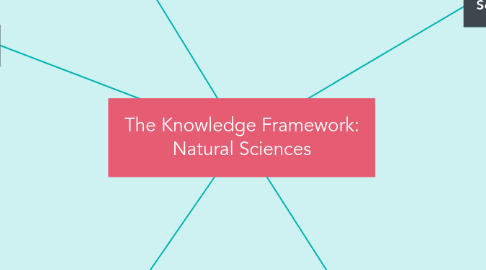
1. Methodology
1.1. General Framework Questions
1.1.1. what are the methods or procedures used in the area?
1.1.2. how these methods generates knowledge?
1.1.3. What are assumptions underlying these methods
1.1.4. What counts as a fact?
1.1.5. What role do models play?
1.1.6. what ethical thinking limits the methods use?
1.2. Specific AOK Ideas
1.2.1. measurement involves interaction with the world
1.2.1.1. can sometimes change aspect of the world
1.2.2. models are important
1.2.3. classification is a central idea
1.2.4. methods employed use
1.2.4.1. reason and sense perception
2. Historical Development
2.1. General Framework Questions
2.1.1. What is the significance of the key points in historical development in the AOK?
2.1.2. how has the history of this area led to its current form
2.2. Specific AOK Ideas
2.2.1. pivotal shifts of thinking in the development of the natural sciences
3. Links to Personal Knowledge
3.1. General Framework Questions
3.1.1. Why is this area significant to the individual?
3.1.2. what is the nature of the contribution of individuals?
3.1.3. what responsibilities rest upon the individual knower by virtue of the knowledge?
3.1.4. what are the implications of this AOK for the individual's perspective?
3.1.5. what assumptions underlie the individual's approach?
3.2. Specific AOK Ideas
3.2.1. gives a view of ourselves
3.2.1.1. as material entities behaving according to universal laws
3.2.2. little space here to see ourselves as rational, free agents, with desires and ability to choose
3.2.3. individuals have contributed in revolutionary ways
3.2.4. use of imagination, intuition and emotions in creation of hypotheses
4. Scope/Applications
4.1. General Framework Questions
4.1.1. what is about?
4.1.2. what practical problems can be solved?
4.1.3. what are important questions currently unanswered?
4.1.4. are there any ethical considerations that limit the scope?
4.2. Specific AOK Ideas
4.2.1. a system of knowledge of the natural world
4.2.1.1. based on observation
4.2.1.2. constructed using reason and imagination
4.2.2. shared knolwedge
4.2.2.1. often shared by large grouping geographically spread
4.2.2.2. largely independent of culture
4.2.3. prediction important feature
4.2.4. understanding is a prime purpose
4.2.5. interested in producing generalised (about natural world) :
4.2.5.1. statements
4.2.5.2. principles
4.2.5.3. scientific laws
4.2.6. laws are casual
4.2.6.1. e.g if event a happens then event b will happen as a result
5. Concepts/Language
5.1. General Framework Quetstions
5.1.1. What role does language play?
5.1.2. What are the roles of the key concepts and terms that provide the building blocks?
5.1.3. What metaphors are appropriate?
5.1.4. What is the role of convention in this area?
5.2. Specific AOK Ideas
5.2.1. many laws in natural sciences are stated using language of MATHEMATICS
5.2.2. language in science is PRECISE
5.2.2.1. to eliminate ambiguity
